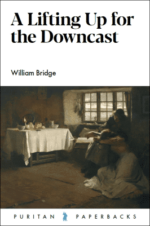save
$3.49The Case and Cure of a Deserted Soul (Joseph Symonds)
$11.50$14.99
In The Case and Cure of a Deserted Soul, Joseph Symonds (d. 1652) explores the nature, causes, and treatment of spiritual depression — a state that arises when God seems to hide his face, leaving the Christian to walk alone in a “dark night of the soul.” In Symond’s word, every aspect of this painful experience is examined with a surgeon’s precision, a philosopher’s insight, and the Word of God’s wisdom on how to gain a firmer footing and emerge from this melancholy hour with renewed strength and vivacity.
Previously out-of-print, this classic treatise has been carefully prepared for the benefit and enjoyment of a new generation of Christian readers.
Out of stock
The Case and Cure of a Deserted Soul
In The Case and Cure of a Deserted Soul, Joseph Symonds explores the nature, causes, and treatment of spiritual depression — a state that arises when God seems to hide his face, leaving the Christian to walk alone in a “dark night of the soul.” In Symond’s word, every aspect of this painful experience is examined with a surgeon’s precision, a philosopher’s insight, and the Word of God’s wisdom on how to gain a firmer footing and emerge from this melancholy hour with renewed strength and vivacity.
Previously out-of-print, this classic treatise has been carefully prepared for the benefit and enjoyment of a new generation of Christian readers.
Topics Include:
The Table of Contents is quite extensive, covering several pages. Key subjects include:
- Sometimes the godly suffer desertion
- Symptoms and consequences of desertion
- Desertions intended to correct our pride and carelessness
- One purpose of desertion is to instruct us concerning our sinfulness and weakness
- Persuasive considerations to move us to restore communion with God
- Some are deserted in appearance only
- Misjudgments about desertions
- The causes and cure of this sad condition
About the Author
Joseph Symonds (d.1652) was for some time the worthy assistant of Mr. Thomas Gataker, at Rotherhithe, near London; but afterwards he became rector of St. Martin’s, Ironmongers lane, in the city. Having espoused the sentiments of the independents, he forsook the church of England, left his benefice, and went to Holland. After his departure, Archbishop Laud, in the year 1639, pronounced against him the sentence of deprivation, by which the good man lost his living, after he had given it up. To escape the storm of persecution, Mr. Symonds settled at Rotterdam, where he was chosen pastor to the English church, in the place of Mr. Sydrach Sympson.
In this situation, his deportment and his doctrine were particularly conciliatory, and his labours eminently useful. Mr. Edwards, to reproach his sentiments and to cloud his memory, says, “that his independent church at Rotterdam was overgrown with anabaptism; and that he wrote to his friends in England, saying, he was so pestered with anabaptists, that he knew not what to do.” Mr. Robert Park, afterwards one of the ejected nonconformists, was his assistant in the pastoral office. It appears that he was living in the year 1646, and still pastor of the church at Rotterdam.
Though he was an independent, Edwards styles him “one of the most moderate and modest of that way.” Though pastor of a church in a foreign land, he was sometimes called to preach before the parliament.
[adapted from The Lives of the Puritans by Benjamin Brook; vol.3, pp.39-40]
| Weight | 0.92 lbs |
|---|









